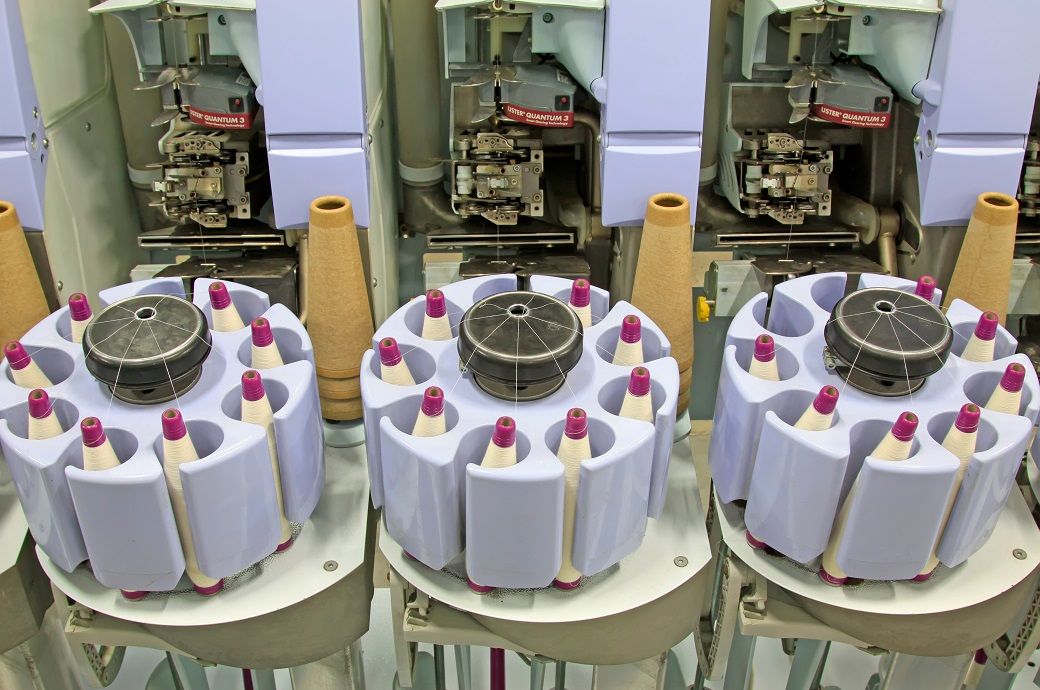
In the Ludhiana market, demand from the fabric industry was below average, and cotton yarn prices stayed near previous levels. A trader from Ludhiana told Fibre2Fashion, “There has been no notable change in market dynamics. Summer demand has been delayed this year due to uncertainty in the downstream industry. We are waiting for summer demand to pick up after Diwali.”
In Ludhiana, 30 count cotton combed yarn was sold at ₹262-272 (approximately $3.13-3.25) per kg (inclusive of GST); 20 and 25 count combed yarn were traded at ₹252-262 (approximately $3.01-3.13) per kg and ₹257-267 (approximately $3.07-3.19) per kg, respectively; and carded yarn of 30 count was noted at ₹242-247 (approximately $2.89-2.95) per kg today, according to trade sources.
Cotton yarn prices also remained stable in Delhi. Market participants are eager to gauge the cotton market trend in the coming weeks. According to trade sources, buyers are reluctant to stockpile in the current scenario but could return if global cotton prices show strong support, which has not been observed yet.
In Delhi, 30 count combed knitting yarn was traded at ₹267-270 (approximately $3.19-3.22) per kg (GST extra), 40 count combed at ₹289-297 (approximately $3.45-3.54) per kg, 30 count carded at ₹244-246 (approximately $2.91-2.94) per kg, and 40 count carded at ₹269-272 (approximately $3.21-3.25) per kg today.
Panipat, the home textile hub of India, saw a further rise in recycled polyester fibre prices. However, recycled yarn and cotton comber prices remained stable amid low trading volumes. Trade sources reported that recycled polyester fibre manufacturers are raising prices due to geopolitical tensions in the Middle East. However, the price of virgin polyester fibre did not increase at the same rate. Traders noted that the lower cost of recycled polyester fibre and sustainability commitments are pushing spinning mills to ramp up purchases. The short supply of PET bottles and higher exports of chips (made from PET bottles and used as raw material for fibre) have also contributed to the rise in recycled polyester fibre prices. In contrast, recycled yarn demand from the home furnishing segment remained weak, though a shift towards the garment industry is offering some support. Despite this, recycled yarn trade remained limited in Panipat.
In Panipat, 10s recycled PC yarn (Grey) was traded at ₹78-82 (approximately $0.93-0.98) per kg (GST paid). Other varieties and counts were noted at 10s recycled PC yarn (Black) at ₹53-56 (approximately $0.63-0.67) per kg, 20s recycled PC yarn (Grey) at ₹96-102 (approximately 1.14-1.21) per kg and 30s recycled PC yarn (Grey) at ₹130-135 (approximately $1.55-1.61) per kg. Cotton comber prices were noted at ₹100-107 (approximately $1.19-1.27) per kg and recycled polyester fibre (PET bottle fibre) at ₹77-81 (approximately $0.92-0.96) per kg today.
In north India, cotton prices increased by ₹10 per maund (37.2 kg) due to a rise in cotton seed prices. In particular, Haryana saw good arrivals of cotton as farmers accelerated cotton ball picking. Trade sources indicated that seed cotton (Narma) gained in the past few days due to increased cotton seed prices and lower moisture content in the crop. Cotton arrivals totalled 7,000 bales of 170 kg each in north India, comprising 700 bales in Punjab, 4,000 bales in Haryana, 1,000 bales in upper Rajasthan, and 1,300 bales in lower Rajasthan.
In Punjab, cotton prices ranged from ₹5,770 to ₹5,780 (approximately $68.72-68.84) per maund of 37.2 kg. In Haryana, prices were ₹5,760-5,770 (approximately $68.60-68.72) per maund. In upper Rajasthan, cotton was priced between ₹5,770-5,780 (approximately $68.72-68.84) per maund, while in the Bikaner region of lower Rajasthan, prices ranged from ₹5,790-5,800 (approximately $68.96-69.07) per maund. Cotton prices in lower Rajasthan were between ₹54,800 and ₹55,300 (approximately $652.63-658.59) per candy of 356 kg, while seed cotton was priced between ₹7,200-7,600 (approximately $83.37-88.14) per quintal of 100 kg.
ALCHEMPro News Desk (KUL)
Receive daily prices and market insights straight to your inbox. Subscribe to AlchemPro Weekly!